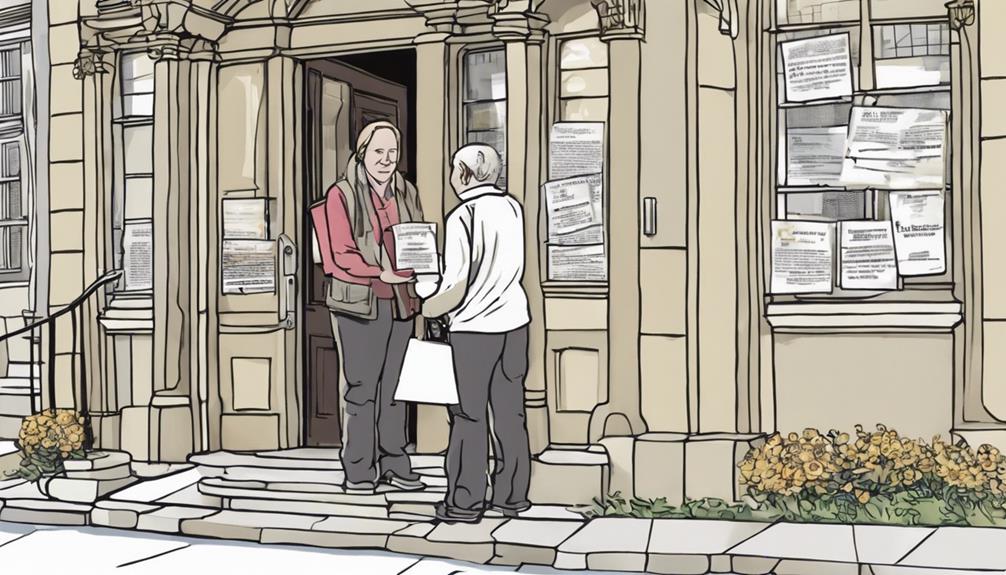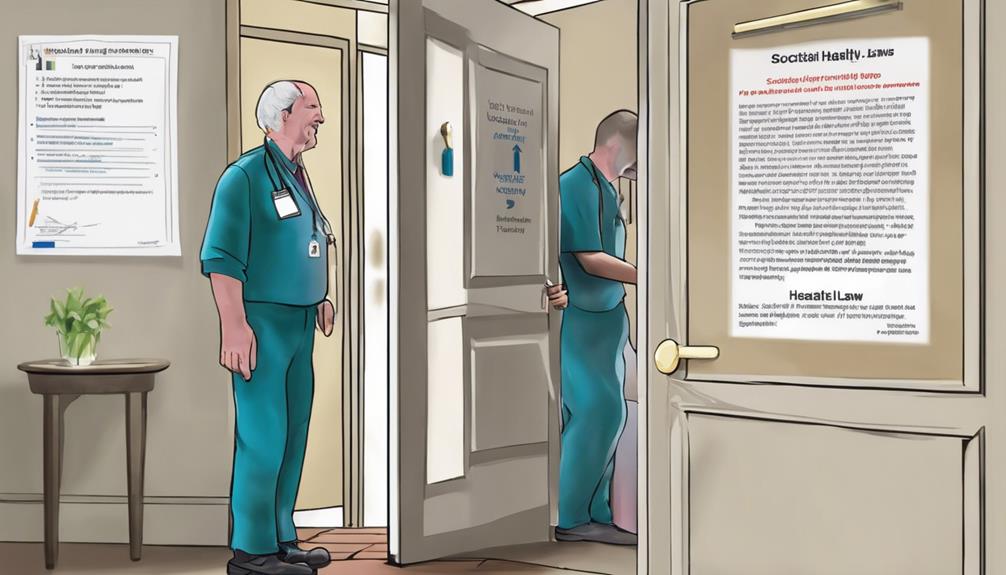In Scotland, deciding whether to accept or decline a health visitor is a significant part of managing your healthcare journey. The factors influencing these choices can differ, making it crucial to grasp the intricacies of this decision-making process.
But what factors might influence someone to refuse this service? Let's explore the nuances of this autonomy and the impact it can have on one's healthcare decisions.
Key Takeaways
- Refusing a health visitor is a legal right for parents in Scotland.
- Parental autonomy is upheld in healthcare decisions.
- Declining health visitor services is possible through formal communication.
- Respecting individual choices and autonomy is paramount in healthcare interactions.

PEUTIER 8 Inch Letter Parking Stencils – Visitor, Reserved, Lot Paint Templates for Guests, Customers, Residents – 2pcs, White
Package Content: You will receive 2 pieces of visitor parking stencils that can be spray painted, air brushed,…
As an affiliate, we earn on qualifying purchases.
As an affiliate, we earn on qualifying purchases.
Legal Right to Refuse Health Visitors
Deciding to refuse a health visitor in Scotland is a legally supported choice that parents can make regarding their child's healthcare. In Scotland, there's no legal obligation for parents to engage with the Health Visiting service. This legal right to refuse aligns with the principle that parents have the ultimate responsibility to make healthcare decisions for their children.
State interference in healthcare matters, including the involvement of health visitors, necessitates parental consent or a court decision. This underscores the importance of parental autonomy in determining the best course of action for their child's well-being.
Participation in health visitor services is optional and not compulsory by law in Scotland, providing parents with the freedom to choose the level of involvement they prefer in their child's healthcare. Ultimately, the right to refuse a health visitor empowers parents to exercise their parental responsibility and navigate healthcare decisions in a manner that aligns with their beliefs and preferences.
parental consent form for health visitors
As an affiliate, we earn on qualifying purchases.
As an affiliate, we earn on qualifying purchases.
Autonomy in Healthcare Decisions

The legal right to refuse a health visitor in Scotland upholds the principle of parental autonomy in healthcare decisions, emphasizing the importance of individuals' self-governance in overseeing their child's well-being. In the Scottish healthcare system, parents bear the legal responsibility to determine whether engaging with health visitor services aligns with their preferences.
This right to refuse is pivotal in safeguarding autonomy and ensuring that informed decisions drive healthcare choices. State interference in healthcare services necessitates either parental consent or a court decision, underscoring the significance of respecting parental autonomy in healthcare decisions.

A Parent's Guide to Starting Psychiatric Medications for Kids: Start Low and Go Slow
As an affiliate, we earn on qualifying purchases.
As an affiliate, we earn on qualifying purchases.
Steps to Decline Health Visitor Services

One effective way to decline health visitor services in Scotland is by submitting a formal letter to your GP. Understanding that refusing these services is within your rights, allowing you to choose the level of support you prefer.
By communicating your decision through a letter, you can clearly express your choice while ensuring that your wishes are respected. Health visitors, upon receiving your refusal, may redirect their focus to families in greater need of support, making a considerate choice for all parties involved.
However, following the initial contact, should the need for health visitor services arise, you have the option to proactively reach out for assistance. Managing the polite refusal of ongoing health visitor visits can be effectively achieved through open and respectful communication channels, fostering understanding and cooperation.

6Pcs Communication Board for Non Verbal Adults Picture Symbol Communication Cards Speech Therapy Tools for Autism Toddlers Kids Aphasia Stroke Patients Hospital Care Home Use Talking Placemats
Package includes: This set includes 6 communication boards, each designed with different themes to help individuals express their…
As an affiliate, we earn on qualifying purchases.
As an affiliate, we earn on qualifying purchases.
Respecting Individual Choices

Respecting individual choices in healthcare decisions is fundamental, particularly when it involves refusing to engage with health visitor services in Scotland. Individuals hold the legal right to decline visits from health visitors without facing mandatory requirements.
Upholding individual choices in healthcare is essential as it empowers individuals to exercise their autonomy in decision-making processes. By asserting the right to refuse a health visitor, patients can actively participate in shaping their healthcare journey based on informed choices. Understanding the available options and making decisions aligned with personal preferences are vital steps when maneuvering healthcare services.
Patient rights encompass the freedom to make decisions that best suit their needs and values. Through respecting individual choices, individuals can actively participate in their healthcare decisions, fostering a sense of autonomy and empowerment within this specific scenario in managing their well-being within the healthcare system in Scotland.
Understanding Scottish Healthcare Laws

Understanding Scottish healthcare laws provides a thorough framework for getting through healthcare decisions in Scotland. When it comes to the Health Visiting service, there's no legal obligation to engage with it. Parents hold the right to refuse to see a health visitor for their child, asserting their refusal rights in making decisions about healthcare services.
It's essential to be informed about options and rights when interacting with the Health Visiting service in Scotland. Asserting refusal rights is vital as the decision to decline health visitor services should be respected by healthcare providers. Being knowledgeable about legal obligations and informed consent empowers individuals to navigate healthcare services effectively.
Frequently Asked Questions
Can You Refuse Health Visitor Scotland?
Yes, we can refuse a health visitor in Scotland. It's our right to decline their services if we feel it's unnecessary. Privacy concerns or feeling intruded upon are valid reasons. We must know our options and assert our rights.
What Is the Role of the Health Visitor in Scotland?
Health visitors in Scotland play an essential role in supporting families with children under 5 by providing health advice, monitoring development, and promoting well-being. They offer parenting guidance, immunization support, and early intervention services.
Is There a Shortage of Health Visitors in Scotland?
Yes, there is a shortage of health visitors in Scotland. This impacts families with young children, leading to challenges in access to support services. Recruitment and retention efforts are essential to address this issue and guarantee quality care.
Do You Need a Health Visitor Uk?
We found that 96% of families in the UK utilize health visitor services voluntarily. These professionals offer support and guidance, but you can opt-out if preferred. It's important to know your rights and make choices that align with your needs.
Can Refusing a Health Visitor Affect My 24-Month-Old’s Speech Development?
Refusing a health visitor can impact your 24-month-old’s speech development. It’s crucial to seek tips for toddler language development from professionals. Early intervention is key in addressing speech delays and ensuring your child reaches crucial developmental milestones. Don’t hesitate to seek guidance from experienced professionals.
Conclusion
In Scotland, the right to decline a health visitor is a fundamental aspect of healthcare autonomy. Just like choosing which path to take on a journey, individuals have the power to decide what's best for themselves and their families.
By respecting these choices, we empower individuals to navigate their own healthcare journey with confidence and independence.
It's important to remember that everyone's path is unique, and the right to decline is an essential part of that journey.







